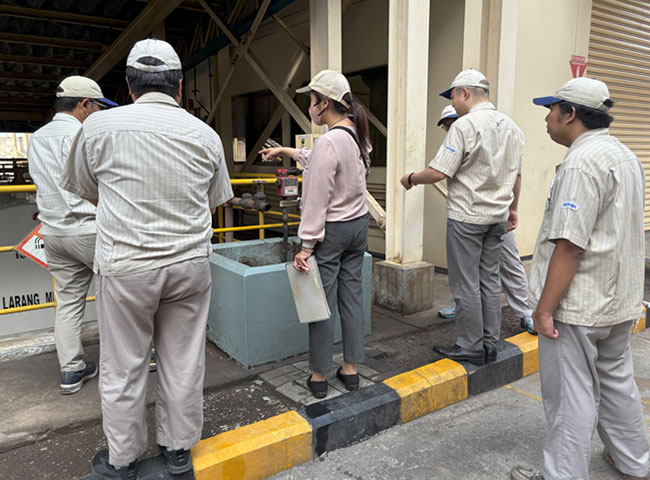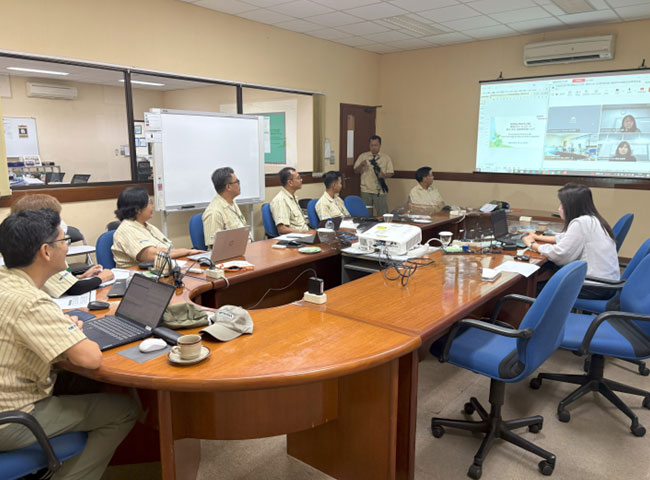TThe corporate philosophy represents the basic concept of all corporate activities, and MITSUBA’s strategies, plans, various systems, business activities, etc., are all built under the corporate philosophy. MITSUBA places the “Mission Statement” that constitutes this corporate philosophy as its sustainability policy.
MITSUBA Group aims to be a company that meets the expectations of the society and is trusted by putting its philosophy into practice.

We express our stance as a code of practice so that we can be the most trusted by all of our stakeholders, including our customers, employees, suppliers, shareholders/investors, local communities, etc. who support the activities of MITSUBA Group. We believe that having each and every one of us understand the spirit of the Group Code and faithfully comply with it will lead to greater transparency as a company and the trust of our customers.
We express our stance as a code of practice so that we can be the most trusted by all of our stakeholders, including our customers, employees, suppliers, shareholders/investors, local communities, etc. who support the activities of MITSUBA Group. We believe that having each and every one of us understand the spirit of the Group Code and faithfully comply with it will lead to greater transparency as a company and the trust of our customers.
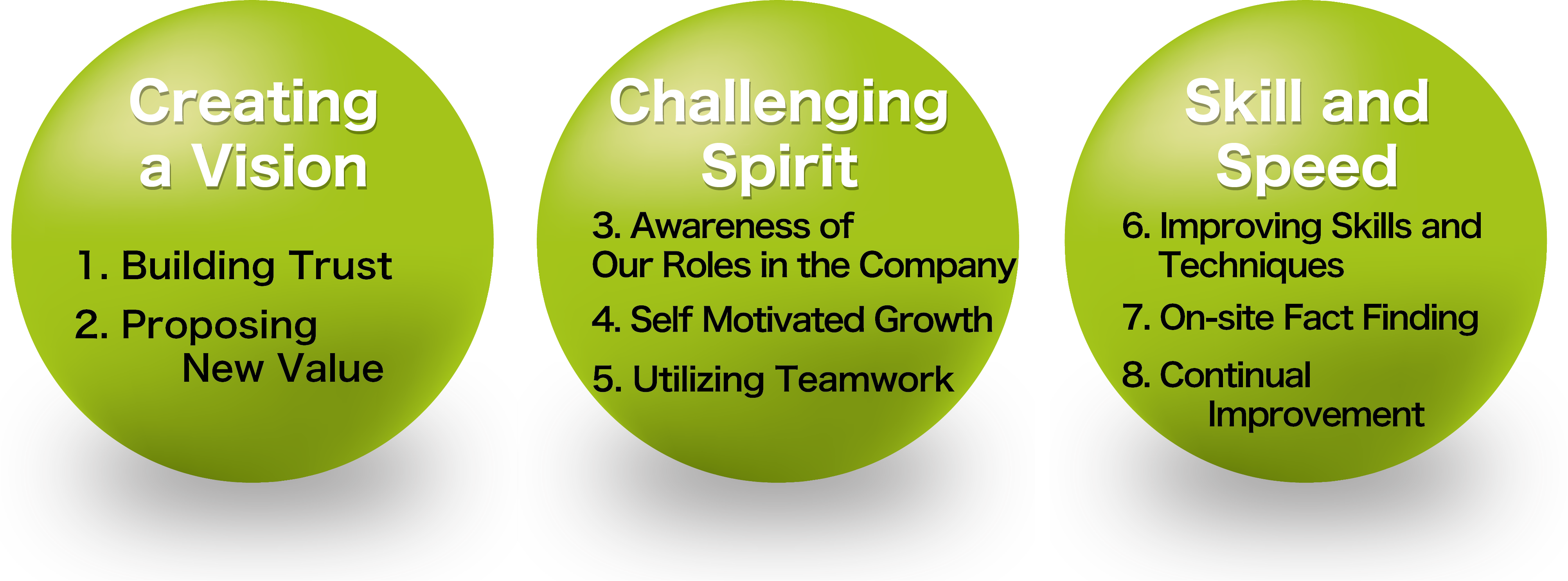
The “How We Should Act” details the sustainability actions that each MITSUBA Group employee should practice in his / her daily work in order for MITSUBA Group to respond to society’s expectations and build a trustworthy business. To ensure we respond to society’s expectations and are a trustworthy business, MITSUBA has established the items in “How We Should Act.”
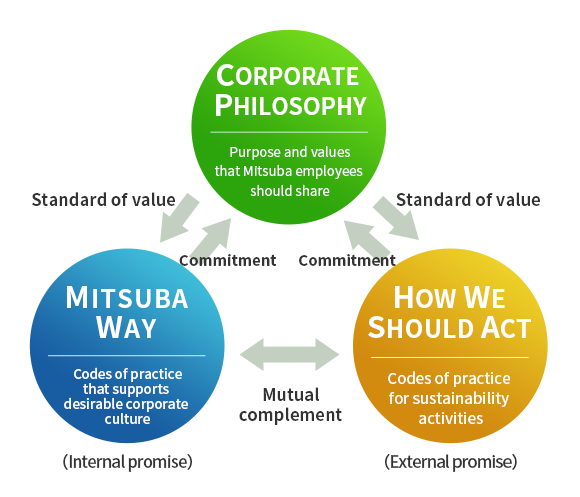
MITSUBA Group’s business has relationships with stakeholders such as customers, employees, suppliers, shareholders/investors, and local communities. Based on our Mission Statement, we respect two-way dialogue with all stakeholders involved in our business and carry out various activities to “provide pleasure and peace of mind.”
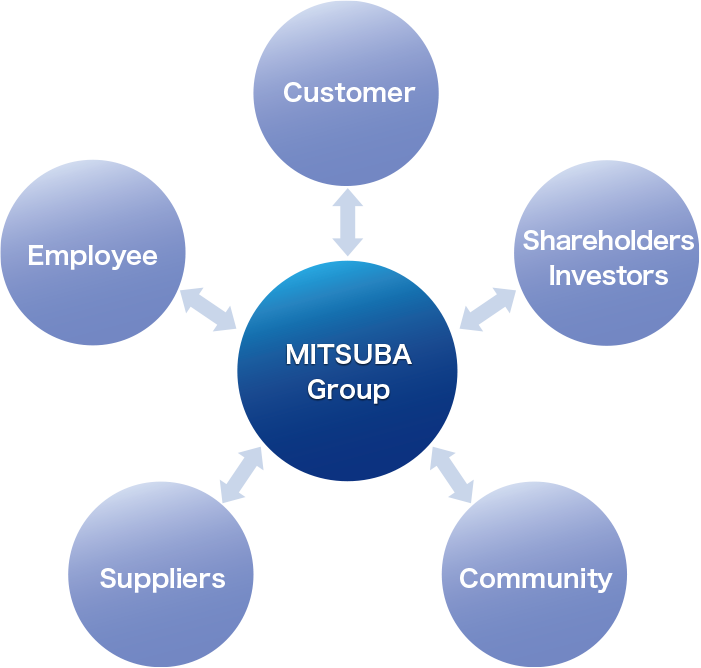
| Target | Description | Frequency |
|---|---|---|
| Customers | Collaboration to realize customer policy | Daily |
| Cooperation in surveys, etc. related to sustainability | Daily | |
| Employees | Explanation of performance, policies, and strategies by the president and vice president (Management Policy Meeting) | Twice a year |
| Internal communication through employee-only sites, etc. | Daily | |
| Shareholders Investors |
Explanation of business results, policies and strategies (financial result meetings, etc.) | Twice a year |
| Explanation of performance and policies/strategies (individual visits) | 4 times a year | |
| Plant visits, business explanations, etc. (plant visits) | About once a year | |
| Providing information through sustainability reports and corporate websites | Daily | |
| Suppliers | Co-creation with suppliers (productivity improvement activities) | Daily |
| Presentation of MITSUBA Group supplier sustainability guidelines (procurement policy briefing) | About once a year | |
| Local community | Environmental volunteers such as forest maintenance and beautification activities | Daily |
| Participation in local events | Daily |
Through the “ESG Committee”, MITSUBA Group confirms priority issues related to sustainability, and promotes and controls appropriate operations. We also confirm and improve the status of MITSUBA Group’s compliance with laws and social norms. Furthermore, we analyze and evaluate possible losses and crises in MITSUBA Group and implement control for responses. We have set up committees for problem solving in each area, which have experts working in each field.
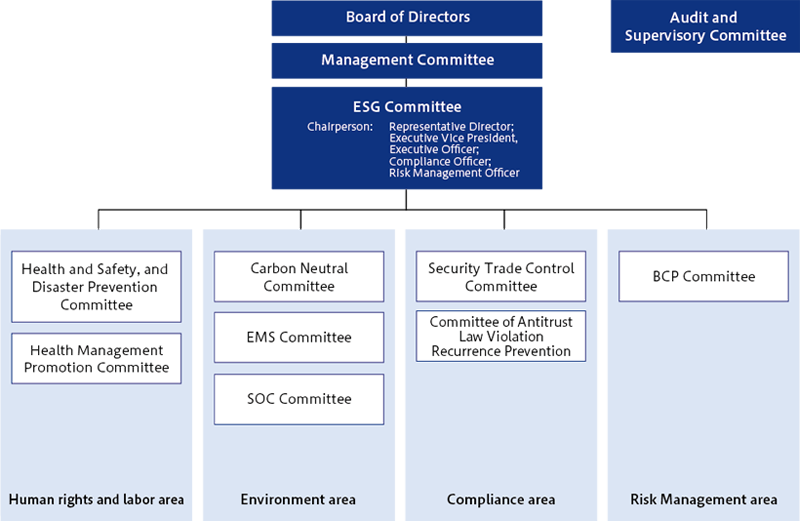
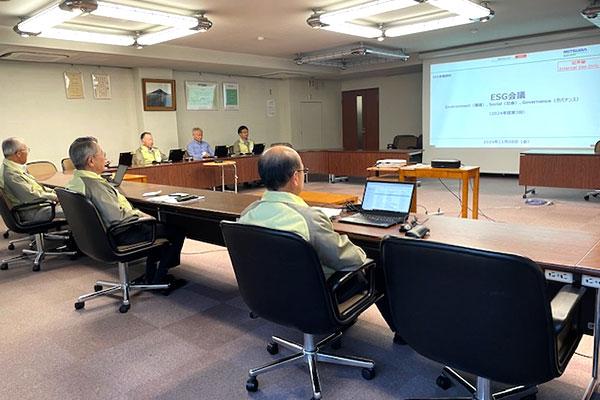
The MITSUBA Group holds an ESG committee chaired by the Representative Director and Executive Vice President four times a year. MITSUBA Group sets social issues that the MITSUBA Group should particularly focus on solving priority issues, clarifying its goals, and monitoring its progress. The members of the committee include Executive Officers in charge of Finance, Executive Officers in charge of Production, and those in charge of sustainability-related departments. Directors who are members of the Audit and Supervisory Committee and the Head of the Internal Auditing Department also participate as observers. Furthermore, we have established a system in which matters related to sustainability information disclosure, which were discussed at the ESG committee, are tabled at the Management Committee, and is also reported to the Board of Directors.
At the ESG committee, the following are discussed:
Activities in FY2024 (Main Agenda)
Each MITSUBA Group company has a framework in place to achieve its sustainability policy. Group companies formulate action plans to achieve the decisions of the “ESG Committee,“ to achieve MITSUBA Group goals, and to solve problems unique to each Group company. The Group companies also evaluate and provide feedback on the status of achievement.
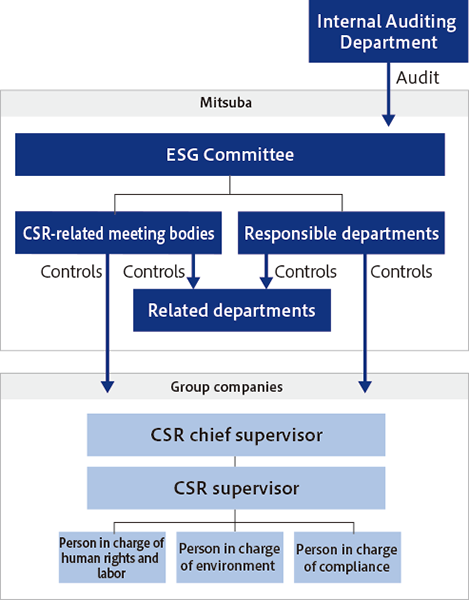
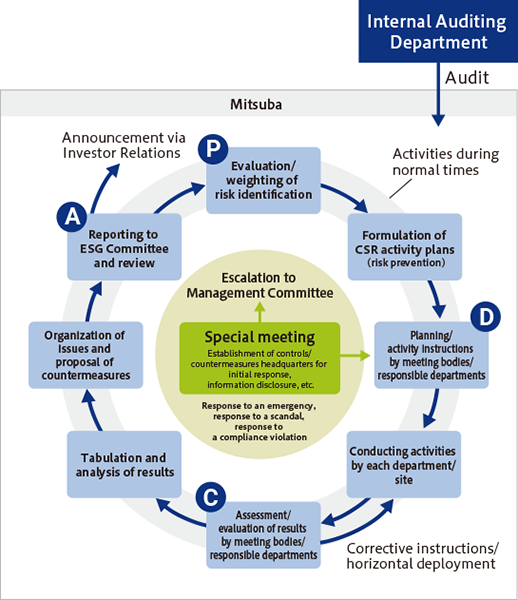
MITSUBA undergoes regular (once a year) sustainability performance evaluation by a third-party organization, and strives to maintain and improve the system by incorporating any issues that emerge into the next fiscal year's plan. The evaluation results and improvement plans are reported and discussed at the ESG committee meeting.
Moreover, each company within the MITSUBA Group regularly conducts self-evaluation using check sheets based on the Group's sustainability standards. From these results, issues facing the entire MITSUBA Group are identified and incorporated into the plans for the following year, thereby strengthening the sustainability management system of the entire MITSUBA Group.
| Target | Domestic and overseas group companies (33 companies) | |
|---|---|---|
| Recovery rate | FY 2023: 100% FY 2024: 100% | |
| Items to be confirmed | General | ESG goal setting and education implementation status |
| Human rights and labor | Status of initiatives regarding respect for human rights, working hours, occupational health and safety, conflict minerals, etc. | |
| Environment | Status of initiatives regarding environmental management, pollution prevention, resource conservation, chemical substance management, etc. | |
| Compliance | Status of initiatives regarding competition law, anti-corruption, conflicts of interest, export transactions, intellectual property protection, etc. | |
| Frequency | Once a year | |
In order to achieve the "Enhancement of Sustainability" stated in its Medium-term Management Plan, MITSUBA holds status confirmation meeting on sustainability activities at overseas group companies. At the confirmation meetings, starting with education on sustainability, participants confirm the current status of sustainability activities, carbon neutrality initiatives, and the PDCA cycle for the operation of environmental management systems on-site and with actual items, which leads to the identification of issues, improvement support, and proposals. Moreover, through dialogue with each person in charge, we share local ideas and initiatives, listen to the voices and requests of those on the ground, and deepen cooperation and mutual understanding across the entire Group, leading to further growth.
On-site inspection and training at the Indonesian site
